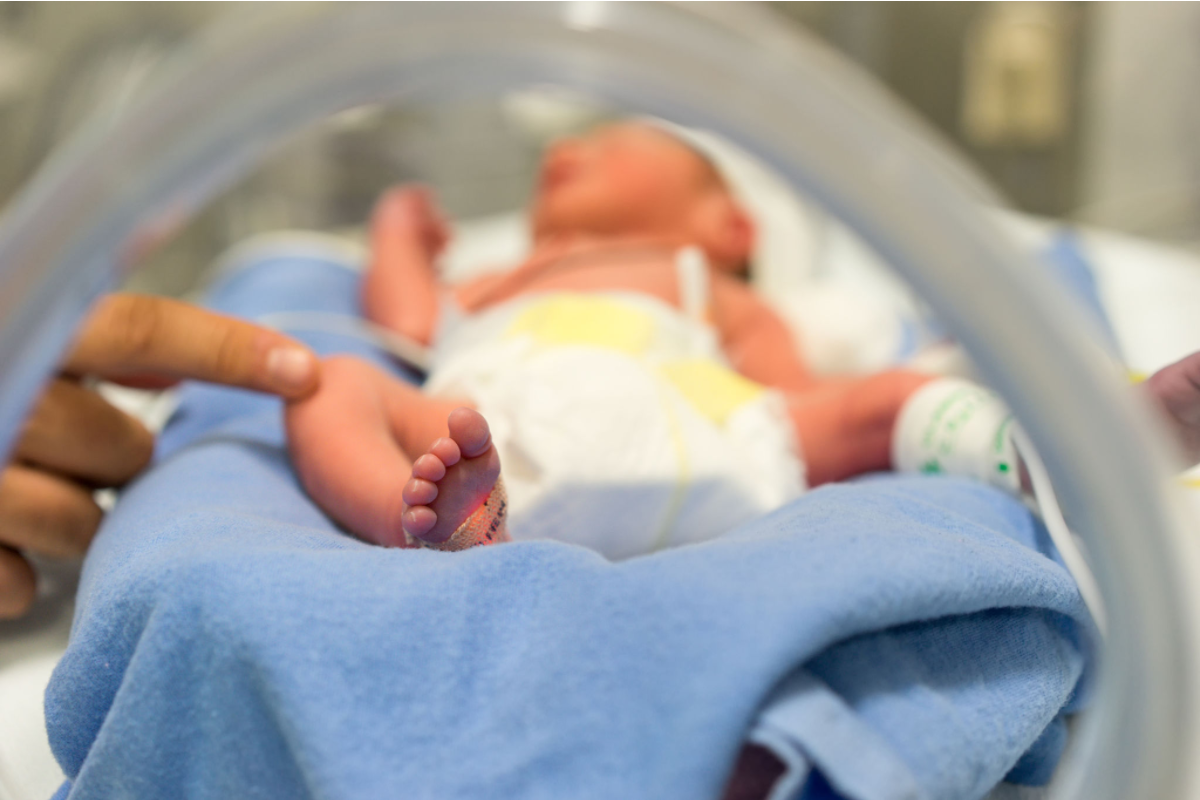November is a month that holds profound significance for families across the nation, as it marks Prematurity Awareness Month—a time when we come together to raise awareness about the challenges and triumphs of premature birth. For parents, the journey of having a preemie can be filled with both joy and anxiety, as they navigate the unique complexities of early parenthood. It’s a journey that requires unwavering strength, resilience, and support, and that’s where Motherhood Center, a holistic wellness resource in Houston, Texas, steps in as a guiding light.
It’s essential to clarify that Motherhood Center is not a medical facility; instead, it’s a dedicated sanctuary where families can find a wealth of support and resources to assist them on their preemie journey. At Motherhood Center, we understand that the arrival of a premature baby can be an unexpected and emotionally charged experience. Our mission is to be a beacon of hope for families, offering expert advice, emotional support, and a sense of community during this challenging time. In this article, we’ll explore the significance of Prematurity Awareness Month, delve into the understanding of prematurity, and uncover the ways in which Motherhood Center provides comprehensive non-medical support for preemie families. Join us on this journey as we celebrate the strength, love, and resilience of these extraordinary parents and their little miracles.
Understanding Prematurity
Prematurity, often referred to as preterm birth, is a significant and life-altering event that can affect both infants and their families. It occurs when a baby is born before completing 37 weeks of gestation, a period crucial for their growth and development. While the exact cause of premature birth can be complex and multifaceted, it’s essential to recognize the various factors that contribute to this phenomenon.
What Is Prematurity?
Prematurity is defined as the birth of a baby before the 37th week of pregnancy. A full-term pregnancy typically lasts around 40 weeks, and during this time, the baby’s organs and systems develop and mature. Babies born prematurely may not have had the chance to complete this crucial stage of development. As a result, they often face health challenges and may require specialized care. The degree of prematurity can vary, with “extremely preterm” babies born before 28 weeks, “very preterm” babies born between 28 to 32 weeks, and “moderately preterm” babies born between 32 to 37 weeks.
Causes and Risk Factors
Understanding the causes and risk factors associated with prematurity is essential to addressing and preventing this complex issue. While many preterm births occur without a clear cause, some common risk factors include:
- Multiple Pregnancies: Carrying twins, triplets, or more can increase the risk of preterm birth.
- Infections and Chronic Conditions: Certain infections and chronic health conditions in the mother can lead to preterm labor.
- Stress and Lifestyle Factors: High levels of stress, tobacco or drug use, and poor nutrition can contribute to preterm birth.
- Previous Preterm Birth: A history of previous preterm birth can increase the likelihood of experiencing it again.
- Socioeconomic Factors: Limited access to healthcare and socioeconomic disparities can impact the risk of preterm birth.
Impact on Families
The arrival of a premature baby can be an emotionally charged and often overwhelming experience for families. Parents may find themselves in a state of uncertainty, coping with a range of emotions, including fear, guilt, and anxiety. Preterm birth can have a profound impact on the entire family, as they navigate the challenges of neonatal intensive care, medical interventions, and the unique needs of their tiny miracle.
As we delve into Prematurity Awareness Month, it’s crucial to acknowledge the emotional and practical hurdles that families of preemies face daily. By understanding the complexities of prematurity and the impact it has on families, we can better appreciate the significance of the support and resources provided by institutions like Motherhood Center. In the sections that follow, we will explore how Motherhood Center extends a compassionate hand to parents and their preemie babies, offering a wide range of services and support to help them through this challenging journey.
Resources available at Motherhood Center
At Motherhood Center, we are deeply committed to providing a wide array of resources and support to families navigating the complexities of preterm birth. While we are not a medical facility, our holistic approach ensures that parents and their preemie babies have access to the comprehensive care they need. We understand that this journey is not just about medical care but also emotional and practical assistance.
Baby and Postpartum Doula Services
One of the unique and invaluable resources we offer at Motherhood Center is our Baby and Postpartum Doula services. Our doulas are experienced professionals who provide emotional and practical support to new parents. They offer a wealth of knowledge and guidance during those early, often challenging days of parenthood. For parents of preemies, having a doula by their side can be especially reassuring, as doulas are well-versed in neonatal care and can help parents navigate the unique needs of their premature baby.
Infant Massage Classes
Infant massage is not only a beautiful way to bond with your preemie but also offers numerous benefits for their development. At Motherhood Center, we offer Infant Massage classes where parents can learn the art of gentle touch and its positive impact on their baby’s growth. These classes are designed to empower parents with the skills to provide a soothing and nurturing experience for their little ones.
Childcare Services
Finding high-quality childcare that accommodates preemies’ special needs is a concern for many parents. At Motherhood Center, we assist families in finding suitable childcare options, relieving them of this additional stress. We understand that every preemie is unique, and we work closely with parents to ensure that their childcare choice aligns with their baby’s specific requirements.
Prenatal and Parenting Classes
In addition to addressing the needs of preemies, we offer a range of prenatal and parenting classes that provide essential knowledge and support for expectant and new parents. These classes cover a variety of topics, from childbirth education to infant care, ensuring that parents are well-prepared for the journey ahead.
Mama Circle: A Postpartum Support Class
The postpartum period can be challenging for any new parent, and even more so for those with preemies. Our Mama Circle creates a safe space for mothers to come together, share their experiences, and receive emotional support. It’s a place to connect, find solace in shared stories, and build a network of understanding and compassionate individuals who are on a similar path.
Newborn Care Classes
Our Newborn Care classes provide parents with essential skills and knowledge to care for their premature babies with confidence. These classes cover various topics, from feeding and diapering to recognizing and responding to your baby’s unique needs. They empower parents to provide the best possible care for their preemie.
By offering this diverse range of resources, Motherhood Center aims to be a steadfast pillar of support for families facing the challenges of preterm birth. We recognize that each family’s journey is unique, and our commitment is to provide the guidance and resources they need to thrive during this significant period. In the sections that follow, we will explore how these resources come together to create a nurturing and supportive environment for parents and their preemie babies.
Emotional Support
Emotional support is a vital component of the care provided to families with preterm babies. The emotional journey that parents of preemies embark upon can be intense, marked by a mixture of joy and anxiety, and a need for a strong support network. We recognize that the challenges of preterm birth extend beyond the physical aspects and into the realm of emotional well-being.
Coping with the Unexpected
The birth of a preemie often comes as a sudden and unexpected event, catching parents off guard and leaving them grappling with a whirlwind of emotions. From the initial shock to the uncertainty that follows, parents may experience a rollercoaster of feelings, including fear, guilt, and anxiety. Coping with these emotions is a significant part of the journey, and seeking understanding and empathy during this time is crucial.
Building a Support Network
In the face of preterm birth, building a support network is crucial. One such support network is Motherhood Center’s unique program, “Mama Circle.” Mama Circle serves as a powerful source of emotional support. It is a postpartum support class designed to create a safe and welcoming space for mothers to connect, share their experiences, and find solace in knowing they are not alone on their journey. It’s a place to form bonds with other parents who understand the unique challenges of preterm birth and the emotional hurdles it presents.
Counseling Services
In addition to the camaraderie of Mama Circle, parents who may require more personalized emotional support are encouraged to seek professional counseling services. These independent counseling services offer a tailored approach to address feelings of guilt, anxiety, or uncertainty, providing valuable guidance on the path to emotional healing. While Motherhood Center focuses on building a supportive community and offering resources, professional counseling services unrelated to our center can play a crucial role in helping parents navigate their emotional journey through preterm birth.
Emotional support is a cornerstone of the care offered to families with preterm babies. The journey through preterm birth can be emotionally demanding, and we are committed to providing the guidance, resources, and a strong support network that parents need to navigate this emotional landscape. In the following sections, we will delve into practical resources and wellness programs that offer holistic support for parents and their preemie babies, helping them thrive during this remarkable journey.
Practical Resources
Navigating the practical aspects of caring for a premature baby can be a complex and challenging journey for parents. From specialized care to finding reliable childcare, it’s crucial to access the right resources to ensure the well-being of your preemie.
Preemie-Specific Care
Preterm babies often have unique medical needs, and it’s essential to have access to specialized care and expertise. Neonatal intensive care units (NICUs) are equipped to provide the advanced medical attention that preemies may require. Parents can also benefit from connecting with healthcare professionals who understand the intricacies of preterm birth. These resources can offer guidance on feeding, developmental milestones, and the specific healthcare needs of your preemie.
Navigating Medical Challenges
Preterm birth can come with various medical challenges. Parents should have access to healthcare information and resources to help them navigate these challenges effectively. From understanding the potential complications associated with preterm birth to recognizing the signs of health issues, practical resources are essential for ensuring the well-being of your premature baby.
Finding Quality Childcare
For parents of preemies, finding quality childcare can be particularly challenging. It’s vital to locate childcare providers who are experienced in caring for premature infants and who can accommodate their unique needs. Motherhood Center, while not a medical facility, can offer guidance and support in finding reliable childcare options. Our team can help you connect with childcare providers who understand the specific requirements of preemies, ensuring that your baby receives the best possible care.
Prenatal and Parenting Classes
Education plays a vital role in effective parenting, and our Prenatal and Parenting Classes at Motherhood Center are designed to provide valuable insights into pregnancy, childbirth, and infant care. While these resources offer comprehensive knowledge for expectant parents, it’s important to note that they do not specifically cover preemie babies. These classes empower parents to make informed decisions and provide the best possible care for their babies, regardless of their gestational age. From comprehensive childbirth education to general parenting classes, our programs ensure that parents are well-prepared for the journey of raising a healthy baby, and equipped with the knowledge and skills to navigate the incredible experience of parenthood with confidence and competence.
As parents navigate the practical aspects of caring for their premature baby, accessing the right resources becomes paramount. Whether it’s seeking specialized care, understanding medical challenges, finding suitable childcare, or equipping themselves with essential knowledge through prenatal and parenting classes, practical resources play a vital role in ensuring the well-being of both preemies and their families. In the following sections, we will explore the wellness and rehabilitation programs that further support preemie development and the emotional well-being of parents during this remarkable journey.
Wellness and Rehabilitation
The well-being and development of premature babies are of utmost importance, and wellness and rehabilitation programs play a crucial role in ensuring their growth and health. These programs focus on providing holistic support to preemies, helping them achieve developmental milestones, and assisting parents in caring for their little ones.
Supporting Preemie Development
Preterm babies often require specialized care to support their development. While wellness and rehabilitation programs are not provided at Motherhood Center, it’s important to recognize the significance of these interventions. They may include physical therapy to enhance motor skills, occupational therapy to aid in sensory development, and speech therapy to support communication and feeding.
Mom and Baby Yoga Classes at Motherhood Center
At Motherhood Center, we understand the importance of parent-baby bonding, especially for preemie parents. Our Mom and Baby Yoga Classes offer a unique opportunity for mothers to engage with their preemies, promoting physical and emotional well-being. These classes not only help build a deeper connection between mothers and their babies but also facilitate the physical development of preemies, creating a nurturing and supportive environment.
Massage Services for Preemies and Parents at Motherhood Center
Infant massage is a powerful tool for preemie development and parent-child bonding, and it’s an integral part of our approach at Motherhood Center. Preemies benefit from infant massage in many ways, including improved weight gain, better sleep patterns, and enhanced motor skills. Moreover, we offer massage services for parents to help reduce stress and enhance their emotional well-being, fostering a harmonious environment for both parent and child.
The Power of Doulas at Motherhood Center
Doulas provide invaluable support to parents of preemies at the Motherhood Center. From assisting during childbirth to offering postpartum support, doulas understand the unique challenges and emotions that come with preterm birth. They provide emotional and practical assistance to parents, helping them navigate the journey with confidence and reassurance. While our focus is not on medical care, our doulas offer crucial emotional support that complements the care provided by medical professionals and ensures that parents feel supported throughout their preemie journey.
Wellness and rehabilitation programs focus on the comprehensive well-being of preemies and their families, offering a range of resources to support physical and emotional development. These programs are a vital component in the journey of raising a premature baby, helping both child and parent thrive during this unique and remarkable experience. In the following sections, we will explore the importance of community engagement and awareness in the context of preterm birth.
The Power of Doulas
Doulas are unsung heroes in the journey of preterm birth, providing invaluable support to parents during this challenging time. While they are not affiliated with medical facilities, the impact of doulas on the well-being of preemie families is immeasurable.
Comprehensive Support During Childbirth
Doulas offer comprehensive assistance during the labor and childbirth process. They provide emotional support, encouragement, and practical guidance to expectant parents, helping them navigate the complexities of childbirth. For parents of preemies, this support can be especially reassuring, as doulas are well-versed in the unique needs and concerns that come with premature birth. Their presence offers comfort, understanding, and a sense of security during this pivotal moment.
Postpartum Support and Guidance
The journey of preterm birth extends beyond the delivery room, and postpartum doula services available at Motherhood Center, offer invaluable postpartum support tailored to the unique needs of preemie families. Postpartum doulas understand the intricacies of preterm birth, address feeding challenges, guide parents in establishing routines, and provide emotional support. Their expertise ensures parents are well-prepared and emotionally nurtured throughout this remarkable and unique experience.
Emotional Well-being
The emotional well-being of parents is a critical aspect of the preemie journey, and doulas understand the emotional rollercoaster that can come with preterm birth. They provide a listening ear, a compassionate heart, and a source of unwavering support. Doulas are trained to help parents manage the anxiety, fear, and stress that often accompany the birth of a preemie, creating a more positive and emotionally nurturing environment for both parent and baby.
Doulas play a pivotal role in providing emotional and practical support to parents of preemies. While they are not medical professionals, their expertise in childbirth and their dedication to the well-being of preemie families make them a valuable asset during this journey. In the sections that follow, we will explore the significance of community engagement and awareness in the context of preterm birth, highlighting the importance of coming together to support preemie families on their unique path.
Community and Awareness
In the world of preterm birth, community support and awareness play a pivotal role in aiding families on their unique journey. The combined strength of a supportive community and heightened awareness can make a significant difference in the lives of preemie babies and their parents.
Building a Supportive Community
The power of the community cannot be underestimated. For parents of preemies, knowing that they are not alone and that there is a network of individuals who understand their challenges is immensely reassuring. Whether through local support groups, online forums, or other community resources, connecting with others who have faced similar situations provides emotional relief and a sense of belonging. These communities offer a platform for parents to share experiences, seek advice, and offer solace to one another, creating a strong support system.
Raising Awareness about Preterm Birth
Heightened awareness about preterm birth is essential for early detection, prevention, and support. It educates the public about the potential risk factors and signs of preterm birth, allowing for better preparedness. Additionally, it fosters empathy and understanding among communities, friends, and family members who may be supporting parents of preemies. As more people become aware of the challenges preemie families face, they are better equipped to offer the necessary emotional and practical support.
Advocacy and Fundraising
Advocacy and fundraising efforts are key components in the quest to support preterm birth awareness and care. These initiatives often lead to increased resources for research and development in the field of neonatal care. They also contribute to the development of programs and services aimed at aiding preemie families. By engaging in advocacy and fundraising, individuals and organizations play a critical role in advancing the cause of preterm birth awareness and support.
Community and awareness go hand in hand in the journey of preterm birth. Building a supportive community and raising awareness about preterm birth are integral to providing preemie families with the resources and emotional support they need. Together, these efforts create an environment where parents can confidently navigate the challenges of preterm birth, knowing they are surrounded by a caring and informed community.
Conclusion
In the realm of preterm birth, the journey can be both challenging and unique. As we’ve explored the various facets of preterm birth, we’ve come to understand the importance of a strong support network, heightened awareness, and community engagement in aiding preemie families on their path.
Building a supportive community offers emotional solace and practical guidance to parents, assuring them that they are not alone in their journey. It fosters a sense of belonging, and the knowledge that others have walked a similar path can be immensely reassuring.
Raising awareness about preterm birth is crucial for early detection, prevention, and support. The more people understand the challenges preemie families face, the better equipped they are to provide the necessary emotional and practical support.
Advocacy and fundraising efforts, on the other hand, contribute significantly to the advancement of preterm birth awareness and care. They lead to increased resources for research and development in the field of neonatal care, ultimately benefiting preemie families.
As we conclude, it’s essential to remember that while the Motherhood Center is not a medical facility and does not specialize in prematurity, it offers valuable services to parents on their journey. Whether you are seeking doula services, parenting education classes, childcare services, or virtual classes for those unable to attend in-person sessions, the Motherhood Center is a trusted resource for holistic support during the remarkable journey of parenthood. For more information and to explore the range of services available, we invite you to contact the Motherhood Center. Your path through preterm birth may be unique, but you are not alone, and support is readily available.
FAQs
What are the risk factors for preterm birth?
Risk factors for preterm birth include multiple pregnancies (twins, triplets), infections, chronic conditions (such as diabetes and high blood pressure), a history of preterm birth, and certain lifestyle factors like smoking and drug use.
How can I support a family with a preterm baby?
Supporting a family with a preterm baby can involve offering emotional support, providing practical assistance like meal preparation or childcare, and being a listening ear. Understanding the challenges they face and offering to help in various ways can make a significant difference.
What is the role of a doula in preterm birth?
Doulas provide emotional and practical support to parents during childbirth and the postpartum period. While not medical professionals, they can be invaluable in helping parents navigate the emotional and practical challenges that come with preterm birth.
How can I get involved in preterm birth awareness and support?
You can get involved by participating in local or online support groups, volunteering with organizations focused on preterm birth awareness, and contributing to fundraising efforts. By raising awareness and supporting preemie families, you can make a positive impact.
What services does the Motherhood Center offer for preemie families?
While the Motherhood Center is not a medical facility and does not specialize in prematurity, it offers a range of valuable services for parents, including doula services, parenting education classes, childcare services, and virtual classes for those unable to attend in-person sessions. These services provide holistic support to families on their journey through parenthood.







